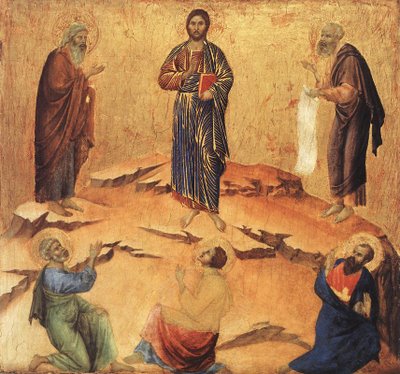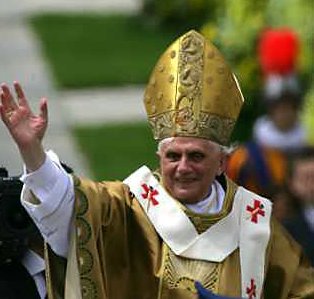On a Second Sunday in Lent

'Tis good, Lord, to be here,Joseph A. Robinson
Thy glory fills the night;
Thy face and garments, like the sun,
Shine with unborrowed light.
'Tis good, Lord, to be here,
Thy beauty to behold
Where Moses and Elijah stand,
Thy messengers of old.
Fulfiller of the past,
Promise of things to be,
We hail Thy body glorified
And our redemption see.
Before we taste of death,
We see Thy kingdom come;
We fain would hold the vision bright
And make this hill our home.
'Tis good, Lord, to be here.
Yet we may not remain;
But since Thou bidst us leave the mount,
Come with us to the plain.
In our meditations on today's lections, I note an invitation to look beyond the substitutionary possibilities of Jesus' death (which is certainly strongly represented in the tradition) and to reflect on the message inherent in the death and resurrection of Jesus taken as a whole.
In the crucifixion of his only son, the human family has certainly committed the ultimate offence against God. God has responded to this horror, not with vengeance, but with compassion, forgiveness, healing. God is willing that Jesus should suffer this, not so much to pay some cosmic debt, but rather to reveal that Love is greater than fear, greater than death, that debts are not so much paid, as forgiven.
There is true rejoicing in Mudville, not because Casey is at bat, but because God's love transcends the game, every game, even that of debt and debtor.
Let us take this opportunity to look to the passion, not so much to see the consequence of our own sin--which it does reveal and which each of us must confront, but in the light of the resurrection, that God is able to overcome any sin that might separate from him those whom he loves. In the life, death, and resurrection of Jesus, God reveals to us just how far he is willing to go, has gone, does go, to reconcile to himself even the most estranged of his daughters and sons.
Lent is a time for penance, but also a time for rejoicing.
In the crucifixion of his only son, the human family has certainly committed the ultimate offence against God. God has responded to this horror, not with vengeance, but with compassion, forgiveness, healing. God is willing that Jesus should suffer this, not so much to pay some cosmic debt, but rather to reveal that Love is greater than fear, greater than death, that debts are not so much paid, as forgiven.
There is true rejoicing in Mudville, not because Casey is at bat, but because God's love transcends the game, every game, even that of debt and debtor.
Let us take this opportunity to look to the passion, not so much to see the consequence of our own sin--which it does reveal and which each of us must confront, but in the light of the resurrection, that God is able to overcome any sin that might separate from him those whom he loves. In the life, death, and resurrection of Jesus, God reveals to us just how far he is willing to go, has gone, does go, to reconcile to himself even the most estranged of his daughters and sons.
Lent is a time for penance, but also a time for rejoicing.
Genesis 22:1-2, 9a, 10-13, 15-18
God put Abraham to the test.
He called to him, "Abraham!"
"Here I am!" Abraham replied.
Then God said:
"Take your son Isaac, your only one, whom you love,
and go to the land of Moriah.
There you shall offer him up as a holocaust
on a height that I will point out to you."
When they came to the place of which God had told him,
Abraham built an altar there and arranged the wood on it.
Then he reached out and took the knife to slaughter his son.
But the LORD's messenger called to him from heaven,
"Abraham, Abraham!"
"Here I am!" Abraham answered.
"Do not lay your hand on the boy," said the messenger.
"Do not do the least thing to him.
I know now how devoted you are to God,
since you did not withhold from me your own beloved son."
As Abraham looked about,
he spied a ram caught by its horns in the thicket.
So he went and took the ram
and offered it up as a holocaust in place of his son.
Again the LORD's messenger called to Abraham from heaven and said:
"I swear by myself, declares the LORD,
that because you acted as you did
in not withholding from me your beloved son,
I will bless you abundantly
and make your descendants as countless
as the stars of the sky and the sands of the seashore;
your descendants shall take possession
of the gates of their enemies,
and in your descendants all the nations of the earth
shall find blessing
all this because you obeyed my command."
Romans 8:31b-34
Brothers and sisters:
If God is for us, who can be against us?
He who did not spare his own Son
but handed him over for us all,
how will he not also give us everything else along with him?
Who will bring a charge against God's chosen ones?
It is God who acquits us, who will condemn?
Christ Jesus it is who died . or, rather, was raised .
who also is at the right hand of God,
who indeed intercedes for us.
Mark 9:2-10
Jesus took Peter, James, and John
and led them up a high mountain apart by themselves.
And he was transfigured before them,
and his clothes became dazzling white,
such as no fuller on earth could bleach them.
Then Elijah appeared to them along with Moses,
and they were conversing with Jesus.
Then Peter said to Jesus in reply,
"Rabbi, it is good that we are here!
Let us make three tents:
one for you, one for Moses, and one for Elijah."
He hardly knew what to say, they were so terrified.
Then a cloud came, casting a shadow over them;
from the cloud came a voice,
"This is my beloved Son. Listen to him."
Suddenly, looking around, they no longer saw anyone
but Jesus alone with them.
As they were coming down from the mountain,
he charged them not to relate what they had seen to anyone,
except when the Son of Man had risen from the dead.
So they kept the matter to themselves,
questioning what rising from the dead meant.







<< Home